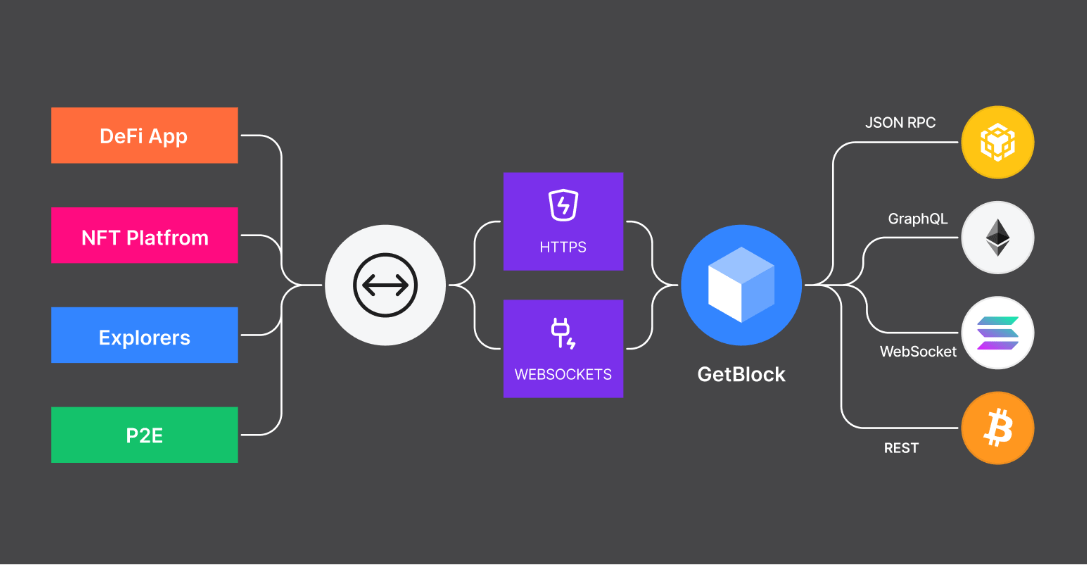Crypto Node Networks: Insights and Best Practices
Crypto nodes serve as essential components that enable users to access the blockchain’s application programming interface (API), facilitating smooth and efficient operation between dApps and decentralized networks.
In today’s post, we’ll specifically focus on Solana RPC nodes provided by GetBlock. Join us as we explore the optimal ways to utilize these nodes and outline the advantages users can anticipate from incorporating them into their projects.
Blockchain Nodes Explained
Nodes in crypto play a critical part in maintaining the functionality of any blockchain. Solana nodes, for instance, run a piece of software that links computers to the SOL chain. They secure the network performance and participate in consensus.
For decentralized applications to function as intended, i.e. to exchange data with the blockchain to fulfill user requests, there should be an entry point to its infrastructure of nodes. This is where RPCs come into the picture. Remote Procedure Calls help send queries to remote servers and get responses automatically manner simply using a set of commands.
The primary purpose of RPCs is to facilitate the connection between Wev3 applications and blockchain networks. Thus, Solana RPCs are protocols that help connect dApps (cryptocurrency wallets, exchanges, you name it) to the network to leverage the power and security it offers.
Solana Nodes and Their Role in the Ecosystem
Everyone using SOL and building on the chain interacts with nodes — computers connected to the network and each other via a specialized client.
Just as any nodes crypto networks rely on, they perform multiple functions for the blockchain to keep it running, depending on the type:
- Validators participate in consensus to approve credible transactions according to rules enforced by a code;
- Full (including RPC) nodes keep track of the overall state of the chain and communicate this data to decentralized applications as well as register new transactions to be verified;
- Archive nodes accumulate all transaction data ever happening in the network, which is usually deployed for research purposes.
The Solana blockchain can also be accessed by using RPC nodes. Solana RPC is designed to handle the requests; they are often devoted to the job rather than taking part in consensus.
Therefore, it’s crucial to have RPC infrastructure that can handle the workload to provide dApp users with an excellent experience and demonstrate Solana’s speed and low latency.
Simplest Access to Solana RPC
Decentralized networks are open to everyone willing to allocate some computational power for the sake of contributing to the network’s growth. However, since nodes perform complex cryptographic operations, running one with not-so-powerful hardware and a home internet connection is one challenging task.
To anyone, who wants to build on the blockchain without setting up the local infrastructure, RPC providers are of great assistance. GetBlock, one of the services in this space, is allowing to leverage the power of over 50 various chains by connecting decentralized applications directly to these chains via nodes.
Solana RPC API ready for deployment is increasingly in demand among GetBlock users.
Exploring Options
When accessing nodes crypto networks operate on, users can explore GetBlock’s services: dedicated or shared nodes.
While the first option ensures clients have a private server set up for their exclusive use, the second option offers access to a Solana node simultaneously used by several clients as a wallet-friendly alternative.
If you’re seeking a tailored Solana RPC experience, it’s worth exploring GetBlock’s dedicated Solana (SOL) nodes. With these, you can seamlessly scale based on demand, benefit from unlimited requests, and rest assured knowing your dApp is expertly supported.
In both cases, GetBlock guarantees top-level connection at the highest uptime possible.
Most Accessible Solana RPC
In fact, every user can grab a free package with 40,000 daily requests to test out shared nodes, without committing to paid options. This option is particularly beneficial for individual users or projects in their early stages of development who may not have the resources to invest in paid options.
Different packages available will suit various use cases due to flexibility: pay per request or per month.
Summing Up
RPC node providers simplify the developer’s journey by offering direct and immediate access to infrastructures powering top blockchains. GetBlock, one of such services, ensures clients find the most suitable option based on their resources and requirements.
With free test packages, users can explore and utilize nodes of crypto networks widely used in Web3 development in 2024, to evaluate their suitability for their needs without incurring any expenses.

